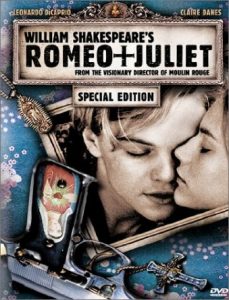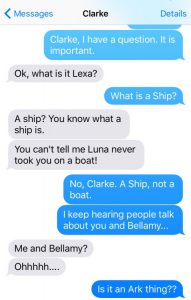I read this article online today that kicked off a storm of raging guilt. To summarize:
So basically, you are taking these characters and putting them into a new world that the writer created, with new circumstances and settings. Now this is where it gets tricky. How alternate can a universe be before you can justify making money from these fanfictions? The delineation of that line appears to be shifting after the publication of Fifty Shades of Gray. Now, I never read the Twilight books, but it is widely known that Fifty Shades started as an AU fanfic of Edward and Bella. Are the characters different enough from the original narrative to keep E.L. James from getting sued? Apparently, as I don’t recall her being sued.
And the article ends with:
If a writer shows promise, encourage them to create original work. Use their fanfiction as a portfolio instead of a quick easy way to make a buck from someone with an established online fanbase. It’s the right thing to do.
(You can read the whole article here if you want.)
“Oh dear!” I thought. “Have I done something horribly unethical by publishing my AU Clexa fic as To Have Loved & Lost? Am I a lesser artist because my work was not ‘original’ enough?”
[ Cue storm of raging guilt and self-doubt ]
Then I started thinking, “Wait, hold up. The term ‘fanfic’ might be new, but there’s *nothing* new about fans of literary work remixing it and putting it forth in a new format. In fact, some of our best-loved literary works are, in essence fanfictions.”
[ Cue nerdy long list of examples ]
Let’s start with the Bard.
Guess who one of the most lauded fanfic writers in the English language is? If you guessed Shakespeare, you would be correct! Here are some examples:
- Hamlet:
A Scandinavian version of the story of Hamlet, Amleth or Amlóði (Norse for “mad”, “not sane”) was put into writing in the 12th century by Saxo Grammaticus around 1200 AD in the Gesta Danorum (from which Shakespeare borrowed). Similar accounts are found in the Icelandic Saga of Hrolf Kraki and the Roman legend of Lucius Junius Brutus, both of which feature heroes who pretend to be insane in order to get revenge. …Many literary scholars believe that Shakespeare’s main source was an earlier play—now lost—known today as the Ur-Hamlet. Possibly written by Thomas Kyd, the Ur-Hamlet would have been in performance by 1589 and was seemingly the first to include a ghost in the story. (from Wikipedia)
- King Lear (*totally* a fanfic!):
The story of King Lear and his three daughters is an old tale, well known in England for centuries before Shakespeare wrote the definitive play on the subject. The first English account of Lear can be found in the History of the Kings of Britain, written by Geoffrey Monmouth in 1135. Monmouth’s account spawned several 16th-century narratives about Lear, including renderings in Holinshed’s Chronicles (first edition, 1577) and in The Mirror for Magistrates (1574). Even the great poet Edmund Spenser recounted Lear’s tragedy in Canto 10, Book II of The Faerie Queen (1590). All of the aforementioned versions of the tale, and possibly dozens more, were readily available to Shakespeare and shaped the main plot of his own drama. However, it is clear that Shakespeare relied chiefly on King Leir, fully titled The True Chronicle History of King Leir, and his three daughters, Gonorill, Ragan, and Cordella, the anonymous play published twelve years before the first recorded performance of Shakespeare’s King Lear. (from Shakespeare Online)
- Troilus and Cressida (stolen from people who stole it from other people who stole it):
The story of Troilus and Cressida is a medieval tale that is not part of Greek mythology; Shakespeare drew on a number of sources for this plotline, in particular Chaucer‘s version of the tale, Troilus and Criseyde, but also John Lydgate‘s Troy Book and Caxton‘s translation of the Recuyell of the Historyes of Troye.[3]
Chaucer’s source was Il Filostrato by Boccaccio, which in turn derives from a 12th-century French text, Benoît de Sainte-Maure‘s Roman de Troie[4]
The story of the persuasion of Achilles into battle is drawn from Homer’s Iliad (perhaps in the translation by George Chapman), and from various medieval and Renaissance retellings. (from Wikipedia)
You don’t need me to keep going, do you? Because I totally could. Most of Shakespeare’s work is a remix / creative derivative of other stories that existed at time, some of which were well-known.
Fanfics *of* Shakespeare
And then of course, just as Shakespeare remixed tales that were contemporary, ancient, and historical, about one GAZILLION artists who’ve come after Shakespeare remixed him. Let’s look at some obvious examples:
- West Side Story: An AU fanfic version of Romeo and Juliet, in which Romeo is renamed Tony and Juliet is renamed Maria. West Side Story uses the Romeo and Juliet setup to explore ethnic tensions in New York City as neighborhoods transitioned from white to minority.
- But actually my favorite Romeo and Juliet fanfic is the canon version done in 1996 with Leo and Claire. 😀
- She’s the Man: I always liked this cross-dressing almost-queer film. She’s the Man feels like the furthest thing you can imagine from Shakespeare, but it’s an AU fanfic version of Twelfth Night.
- And as long as we’re on the topic of teen films that I love, let’s not forget that Ten Things I Hate About You is an AU fanfic of Taming of the Shrew.
- A Thousand Acres: I listened to this literary fiction novel by Jane Smiley on a long road trip with my dad nearly twenty years ago. Without having to be told, I recognized it as a retelling of King Lear — a modern, mid-twentieth century agrarian America AU fanfic.
 (AND WHOA, BIG INSIGHT: Could you not argue that the Clexa story line itself is in essence a lesbian Romeo and Juliet? Think about it… many of the elements are there… star-crossed lovers with “families” who hate each other, a murder that kicks off a sh**storm of tension between the two sides (Tybalt kills Mercutio, Finn kills the villagers; Romeo kills Tybalt in revenge, Lexa effectively kills Finn in revenge)… Right down to the tragic, utterly pointless ending?)
(AND WHOA, BIG INSIGHT: Could you not argue that the Clexa story line itself is in essence a lesbian Romeo and Juliet? Think about it… many of the elements are there… star-crossed lovers with “families” who hate each other, a murder that kicks off a sh**storm of tension between the two sides (Tybalt kills Mercutio, Finn kills the villagers; Romeo kills Tybalt in revenge, Lexa effectively kills Finn in revenge)… Right down to the tragic, utterly pointless ending?)
…so again. I could keep going. Because there about one GAZILLION more examples. Some of these Shakespearian remixes are very close to the original, some of them (like the Lion King) take an idea / plot line from Shakespeare and then rework it.
Oh, speaking of the Lion King. Pause and think about it: Pretty much every Disney film ever made is a fanfic of a much older story. Want me to name some of them? Hunchback of Notre Dame, Aladdin, The Little Mermaid, Beauty and the Beast………..
Other Famous Fanfic Examples
I hope the example of Shakespeare alone is enough to prove the point that modern fanfiction is well within the boundaries of long-established literary traditions of derivative creative works. But there are other examples I can think of right off the top of my head, so I wanted to mention a few here:
- King Arthur: Perhaps nothing in the English (and French) language has been remixed more than King Arthur. There are so many fanfic Arthurs out there that it’s hard to even know where to begin.
- My favorite poet, T.S. Eliot, begins The Wasteland, probably his most famous poem, with a very clear allusion to Chaucer’s Canterbury Tales. In fact, all of Eliot is rife with literary allusions; The Wasteland itself is FULL of lines that he straight-up stole from Chaucer, Richard Wagner, Dante, Charles Baudelaire, etc. etc. etc.
- To use a more modern example, the literary novel Ahab’s Wife steals a character from Herman Melville and then turns her into an entire novel. I think you could call it a Moby Dick canonical fanfic.
Lesbe Honest About What’s Happening Here
The more I thought about the multiple examples of derivative / remix works that are considered mainstream literature — some of them even highly valued contributions to mainstream literature — the more offended I got by the offended writer of the blog post I quoted at the beginning of the article.
Now, I want to be fair to the author of that post and quote them one more time. In addition to their critical comments, they also say:
I honestly don’t have a problem paying for a book where I can not see the characters or settings from the TV show in the story. I imagine it as it’s presented to me, adding things in my own mind. For these types of stories, when someone tells me “you know, that started as fanfic,” I think “huh, well that’s not how I picture them, I never would have known if you hadn’t told me!” That is the sign of a book that has successfully separated itself from the show or characters they do not own.
But the overall tone of the article is one of devaluing fanfiction solely based upon the fact that it’s fanfiction.
As the author correctly points out, “In the world of lesbian fiction, fanfiction is rampant. This stems from the fact that LGBT people have been woefully under-represented in TV and film, so had to create their own world themselves.”
 Guess what? This “creating their own world themselves” has ALSO been done within mainstream fanfiction — think The Wiz, think Hamilton: In both, under-represented minorities commandeer a story they are normally locked out of and make it their own as a way of intentionally subverting and undermining mainstream white power / privilege.
Guess what? This “creating their own world themselves” has ALSO been done within mainstream fanfiction — think The Wiz, think Hamilton: In both, under-represented minorities commandeer a story they are normally locked out of and make it their own as a way of intentionally subverting and undermining mainstream white power / privilege.
I think what we have a real problem with here is not derivative creative work but the concept of “fanfiction” itself. Because who is it created by? That’s the main thing, isn’t it? Not established, professional writers. Not people with power. *Definitely* not people who usually have a voice within Hollywood or within traditional publishing.
I also believe we have some internalized notions about who should be allowed to create legitimate literary work. In particular, I think many fanfic writers either *are* young women or are *perceived to be* young women. Therefore, in devaluing fanfiction, we are falling back into our well-worn cultural reflex of devaluing the work, value, and legitimacy of girls and girl-centric culture.
Let’s acknowledge these biases and admit:
- Remixing creative work with our own reimaginings of it is as old as storytelling itself.
- We need to watch out for thinking less of a literary effort simply because it comes with the word “fanfiction” attached to it.
- Some of our bias towards fanfiction might have its roots in deeply ingrained sexism.
- No, not all fanfiction is at the level of Shakespeare, but some of it is quite, quite good, and we need to respect, appreciate, and thank the artists who give us these lovely pieces of fiction. If it’s bad, let it be bad in on its own merits and not because it’s fanfiction.
(Okay, yeah, I have a dog in this race, obviously, but I think all these points still hold.)



0 Comments